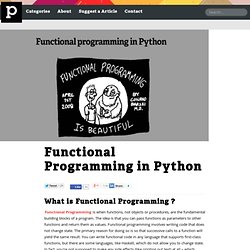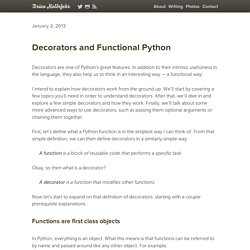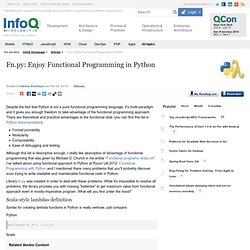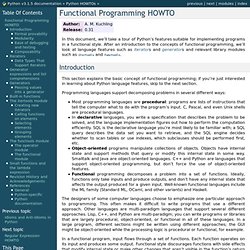

Functional Programming in Python. What is Functional Programming ?

Functional Programming is when functions, not objects or procedures, are the fundamental building blocks of a program. The idea is that you can pass functions as parameters to other functions and return them as values. Functional programming involves writing code that does not change state. The primary reason for doing so is so that successive calls to a function will yield the same result. You can write functional code in any language that supports first-class functions, but there are some languages, like Haskell, which do not allow you to change state. Q1. Q2. Functional Programming in Python Before diving into the concepts of Functional Programming in python, lets understand some basic programming concepts like Procedural Programming and Object Oriented Programming. 1. 2.
A more complete real world example: 3. 3.1 Itertools Let’s start by looking at an important foundation for writing functional-style programs in Python: iterators. 3.1.1 chain() Decorators and Functional Python. Decorators are one of Python’s great features.

In addition to their intrinsic usefulness in the language, they also help us to think in an interesting way — a functional way. I intend to explain how decorators work from the ground up. We’ll start by covering a few topics you’ll need in order to understand decorators. After that, we’ll dive in and explore a few simple decorators and how they work. Finally, we’ll talk about some more advanced ways to use decorators, such as passing them optional arguments or chaining them together. First, let’s define what a Python function is in the simplest way I can think of.
A function is a block of reusable code that performs a specific task. Okay, so then what is a decorator? A decorator is a function that modifies other functions. Now let’s start to expand on that definition of decorators, starting with a couple prerequisite explanations. In Python, everything is an object. We can pass functions around like any other object. Closure Step by step: Fn.py: Enjoy Functional Programming in Python.
Despite the fact that Python is not a pure-functional programming language, it's multi-paradigm and it gives you enough freedom to take advantage of the functional programming approach.

There are theoretical and practical advantages to the functional style (you can find this list in Python documentation): Formal provability Modularity Composability Ease of debugging and testing Although this list is descriptive enough, I really like description of advantage of functional programming that was given by Michael O. Church in his article “Functional programs rarely rot”. I’ve talked about using functional approach in Python at Pycon UA 2012: Functional Programming with Python and I mentioned there many problems that you’ll probably discover soon trying to write readable and maintainable functional code in Python. Library fn.py was created in order to deal with these problems. Scala-style lambdas definition Syntax for creating lambda functions in Python is really verbose, just compare: Functional Programming HOWTO — Python v3.1. In this document, we’ll take a tour of Python’s features suitable for implementing programs in a functional style.

After an introduction to the concepts of functional programming, we’ll look at language features such as iterators and generators and relevant library modules such as itertools and functools. Introduction This section explains the basic concept of functional programming; if you’re just interested in learning about Python language features, skip to the next section. Programming languages support decomposing problems in several different ways: Most programming languages are procedural: programs are lists of instructions that tell the computer what to do with the program’s input. The designers of some computer languages choose to emphasize one particular approach to programming. In a functional program, input flows through a set of functions. Functional programming can be considered the opposite of object-oriented programming. Formal provability Modularity Composability Iterators.